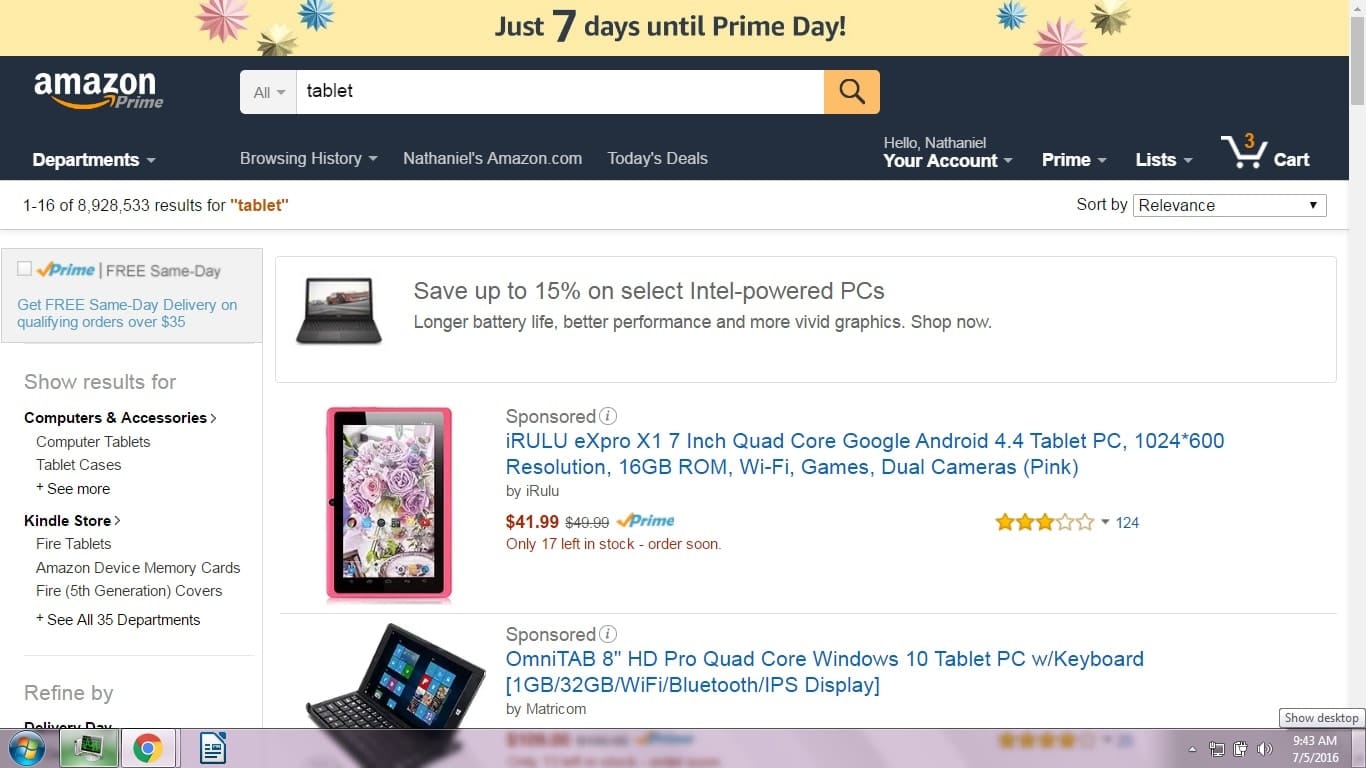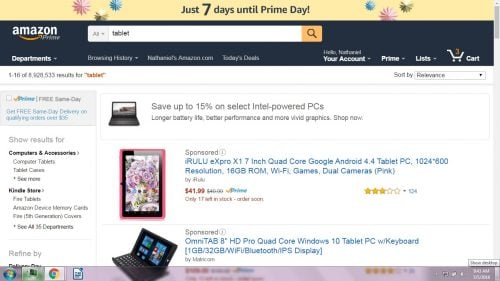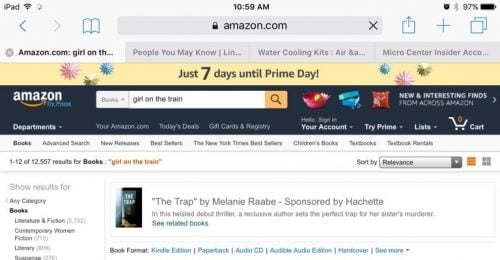Amazon Is Quietly Selling Top Placement in Its Search Results

Amazon is now copying Google’s trick of selling the prime location in search results to advertisers.
I was looking into the NY Times story on Amazon dropping list prices on Monday morning when I found this in the search results.
What I see in this screen shot is: at the top of the screen is a banner ad for Amazon, and below the menu bar is another banner ad, and below that two more ads.
What I don’t see are the search results I was looking for. Those are shoved down off the bottom of the screen. Google has had a similar problem where their search engine doesn’t return any organic search results on the first screen (example), and now Amazon is taking the same user hostile approach.
Yes, Amazon has sold ads on its site for at least four years now, but they were always placed after the information you were looking for. A product listing, for example, has ad spots down the page. In contrast, this search result page shows the ads first.
If you are looking for conclusive proof that Hugh Howey is wrong to claim that Amazon always puts the customer first, look at the screenshot, because we found it. Of course, Amazon was always in this for their own pocketbook; it’s just that for a while (a decade or more) Amazon’s interests aligned with its customers.
Clearly that is no longer the case.
Readers, beware. This ad infestation has not spread to the books category yet, but it is bound to do in the long run, so we should be wary about clicking those first few links.
Edit: No, I was wrong. A reader has shared a screenshot which shows that the first result on a search of the book category is an advert (Thanks, S!):
In light of this latest revelation, that caution extends to all search results on Amazon.com; if this is what they are doing in public, Bezos only know what they are doing behind the scenes.




Comments
DavidW July 5, 2016 um 10:22 am
This has been going on for several months now. Put that on top of bought reviews and the some times strangely dishonest ways that they now compute customer review averages and I don’t use amazon to search, only to buy once I know what I want to buy.
Nate Hoffelder July 5, 2016 um 10:31 am
Thanks for the background.
I hadn’t seen it before, nor could I recall anyone writing about it.
DavidW July 5, 2016 um 1:03 pm
Since it’s only on certain products for certain people it’s hard to catch or replicate. For instance I just searched for tablets and found no sponsored results.
Anthony Pero July 5, 2016 um 12:03 pm
A couple things:
• I’m not getting the same result Nate is. When I did the same search, I got no ads at all. So, this is not happening sitewide yet, if it ever will.
• I randomly did 15 searches. I had "Sponsored" content show up at the top of search results once in that time. So it looks like, every so often, they will put sponsored content in the search results
• I’m not so sure that having two or three clearly labeled "sponsored" results is quite the sin this article makes it out to be. While the Op makes a point that the search results are "below the fold" so to speak, the screen cap is on a 1366×768 landscape display, which accounts for less than 35% of all web traffic last year. Since mobile browsing accounts for more than 50% of all e-commerce traffic, I’d imagine that 35% is a much larger percentage than what Amazon sees at that resolution. On portrait displays, or larger landscape monitors, in most mobile apps, etc, you will see the sponsored content and then a few search results above the fold.
• A huge part of keeping costumers happy is keeping supply lines open. A huge part of keeping supply lines open is keeping suppliers happy. There’s a balance there. I don’t feel manipulated when sponsored search results are as clearly marked as what I see in this screen shots. It lets me know that a company has a product in the category I am looking for that they believe in enough to put money behind.
• Would it be nice if it was in a sidebar, rather than in the same column as the display? I suppose that’s an option on desktop, but its not the best solution for responsive sites. These aren’t superfluos ads being displayed on the page. They are legitimate search results. The OP searched for a tablet. The sponsored ad goes to an amazon product page. Its not going to some other company’s website, its a search result. One that was paid for. And that is clearly marked. What’s the big deal?
Kit July 5, 2016 um 12:51 pm
I also did a number of searches for books and only had sponsored content come up once. And it was when I did the specific search in the example; I couldn’t find it in another search. And I also don’t feel like this is that big a deal; it’s clearly labeled as sponsored content, which you can look at or ignore, as any other ad. It’s a store; it’s going to have ads for things; all online stores do this.
Thomas Knip July 5, 2016 um 2:46 pm
As long as it is clearly labelled as "Sponsored" I can live with that. Been doing the same during my jobs for search engines.
But I could live without it, btw. 😉
Maria (BearMountainBooks) July 5, 2016 um 3:00 pm
As others said, this has been going on for months. They started shifting things well over a year ago and now it’s so bad, their search engine is nearly useless (I say this as a customer who has a gift card she tried to spend this weekend–but it was 3 pages in before I found bed sheets that had anything to do with "Cotton" "King Sized" that weren’t fake merchants selling anything but cotton and ads. Some of those ads didn’t even have to do with bedding.) It’s just as bad for books. You can put in an author name and book title and often you won’t get the book you are looking for (you’re actually better off with just the title or the author, but not both). Worse news than the search engine is that both Walmart and Ebay had better prices and better selection. It’s possible with the search engine not working the way it works, I just couldn’t FIND the selection…
Maria (BearMountainBooks) July 5, 2016 um 3:03 pm
I’d also like to say that I had sponsored ads in EVERY search I did this weekend–It was 4 to 6 ads per page–one at the top, two at the bottom and somewhere in there, a couple of other random ads as I scrolled. It’s a problem because their search engine isn’t finding what I want to buy. In order to find cotton sheets I had to actually go look up brand names to see if Amazon carried them and search that way. This was true when I searched for a linen top–without a brand name entered, I got nothing useful. (And sometimes with a brand name because Amazon doesn’t actually carry a lot of the brand name stuff.)
Mirtika July 5, 2016 um 6:27 pm
OK, I just went to Amazon to test this out. I did a search for "Tanith Lee Silver Metal" as the title of that book just popped in my head.
The search result has a banner way on top about Prime Day that’s looming. Then the first search result is…Tanith Lee’s SILVER METAL LOVER. The second is Tanith Lee’s METALLIC LOVE.
Lemme try again: I put in the ALL search "Lois McMaster Chalion." So, the first result is….Lois McMaster Bujold’s THE CURSE OF CHALION. The second result is its sequel, PALADIN OF SOULS.
So, hey, I’m getting exactly what I searched for.
I have seen sponsored ads when I searched for clothes before, at the bottom of the page. I saw sponsored ads for computers at the top of the page, but after the ads, my search results show in the usual order. I don’t like it, but I understand it’s business. That’s different from actually selling ranking (ie a book is paid by publishers to be put in the top 100 or something.)
Nate Hoffelder July 5, 2016 um 7:03 pm
Well, sure, if you search for very specific terms you will get very specific results. That doesn’t tell us anything we didn’t already know.
David VanDyke July 5, 2016 um 8:40 pm
"If you are looking for conclusive proof that Hugh Howey is wrong to claim that Amazon always puts the customer first, look at the screenshot, because we found it. Of course, Amazon was always in this for their own pocketbook; it’s just that for a while (a decade or more) Amazon’s interests aligned with its customers.
Clearly that is no longer the case."
No, Howey is right, It’s simply that you have misidentified who Amazon’s customers are, while Amazon knows exactly who its customers are: The people that send them the most money.
That’s not the reader looking for a book. It’s the advertiser willing to pay (at a guess) tens of thousands of dollars for those top spots.
Mackay Bell July 6, 2016 um 3:19 am
Look, Amazon is in it for the money. No big surprise. The critical issue for self-publishers, and even for readers, will be transparency. It is important that they mark the ads clearly, but also, what I’m interested in is who is allowed to buy those ads. I’m sure they’ll cost a lot, but if self-publishers get access to that, then I’m not going to be so upset with it. But… if it turns out only the big publishers and major companies are allowed in, then it’s not just about money, it’s about power and shutting out the little guy. That’s what I’m mostly worried about, that indies will lose access (even for money) to customers. And I’m sure thats the dream of big publishing.
John Maberry July 6, 2016 um 11:44 am
The main problem I have with Amazon searches is that they so seldom return the results I am looking for. The same problem exists with Google to a marginally lesser extent. Quotation marks frequently wind up showing nothing. Repeatedly having to put -blah -duh -whatever to eliminate what you don’t want gets tedious. Ads and algorithms–if a retailer sells a whole host of products you get a result for them even if it has nothing to do with the specific item you’re looking for. Actually, I think Amazon is better on books than on, say, electronics.